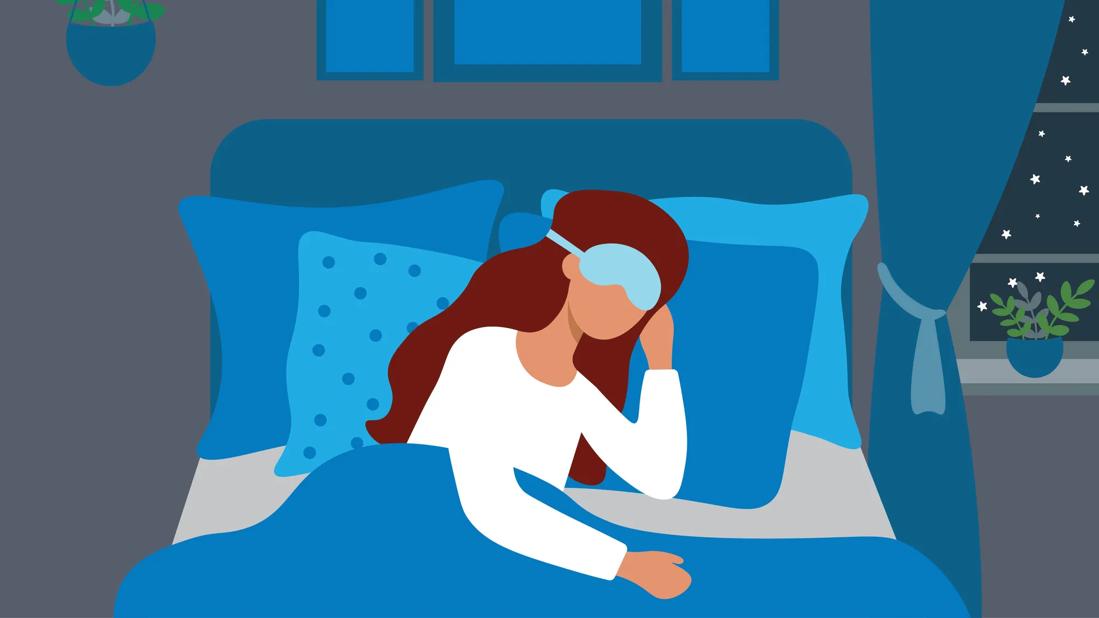If you’re sneezing, you’re definitely awake — you just don’t realize it

Image content: This image is available to view online.
View image online (https://assets.clevelandclinic.org/transform/8bdf0263-4c9f-4d73-aa02-7726310434aa/sleeping-bed-mask-2194020095)
Person in bed asleep, wearing a sleep mask over their eyes
“Can you sneeze in your sleep?” is one of those questions that’s way more fun to ask than it is to answer. That’s because the answer is boring: No, you can’t.
Advertisement
Cleveland Clinic is a non-profit academic medical center. Advertising on our site helps support our mission. We do not endorse non-Cleveland Clinic products or services. Policy
But why can’t you sneeze in your sleep? And why does it seem like your partner, child and even the family dog does? We asked family medicine and genetics practitioner Timothy Tramontana, MD.
Despite what you may have heard, it’s not possible to sneeze while you’re sleeping — even in the earliest stages of sleep. Simply put: If you’re asleep, the part of your brain that notices those sensations is asleep, too.
“Sneezing requires a certain amount of cortical or brainstem stimulation,” Dr. Tramontana explains. “And that threshold actually increases at night. You need to wake up in order to sneeze — and that goes for both children and adults.”
And, just in case you’re wondering: No, sneezing in your sleep can’t kill you … because it doesn’t happen. That story you heard about your friend’s sister’s cousin was just that: A story. Entertaining? Yes! But it’s not based in reality.
We sneeze at night for the same reason we sneeze during the day: Because when our nasal passages are stimulated in some way, they send a message to our brains to clear them out.
Sneezing is involuntary, meaning you can’t control it. It’s a response to:
Advertisement
Right now, you might be wondering: If I’m not sneezing in my sleep, is a bunch of crud just sitting there in my nasal passage all night?
“It is,” Dr. Tramontana confirms. “It stays there because that protective reflex isn’t there to get rid of it. But if the stimulus is strong enough, you’ll wake up in order to sneeze.”
If you’re lucky, you’ll drift right back to sleep and have no memory of sneezing the next day. But if you’re waking up and staying up on a regular basis? That’s a reason to see a provider.
You may be able to trade nighttime sneezing for slumber by making small adjustments, like upping your water intake and keeping your bedroom tidy. Consider:
You can’t sneeze in your sleep — and most nighttime sneezing can be addressed with simple lifestyle changes. But there are some situations where it’s best to seek support from a healthcare provider.
“If you have consistent symptoms at least several times a week over several weeks that don’t seem to be responding to home care, you may want to see your physician,” Dr. Tramontana suggests.
“There are many things that can cause excessive sneezing, from nasal polyps and thyroid issues to the medications you take. And some of them could be cause for concern.”
Dr. Tramontana also recommends reaching out early if you have other symptoms, especially:
Otherwise, rest easy in the knowledge that you’re definitely not conducting a sneeze symphony as you sleep.
Advertisement

Sign up for our Health Essentials emails for expert guidance on nutrition, fitness, sleep, skin care and more.
Learn more about our editorial process.
Advertisement
No, but it momentarily slows down during this involuntary body function
It’s best to allow yourself to sneeze naturally, and cover your mouth and nose with a tissue or turn into your elbow to help prevent the spread of germs
ACHOO syndrome is your trigeminal nerve’s exaggerated response to bright light
Sleep masks can help you create total darkness so you can sleep better
To avoid sleep deprivation and shift work sleep disorder, try adopting habits that minimize light exposure and prioritize daytime sleep
Sleep disorders, mental health conditions and other health concerns can all affect the quality of your sleep
Most people fall asleep within 10 to 20 minutes, but if your experience is different, adjusting your sleep schedule may help
Tart cherry juice contains natural compounds that may support better sleep
Prioritize your health by managing stress, strengthening your social connections and getting quality sleep
Bolsters, blankets, pillows and blocks can offer extra support, stability and comfort
Allergies, postnasal drip, asthma or reflux could be to blame for a cough that won’t quit